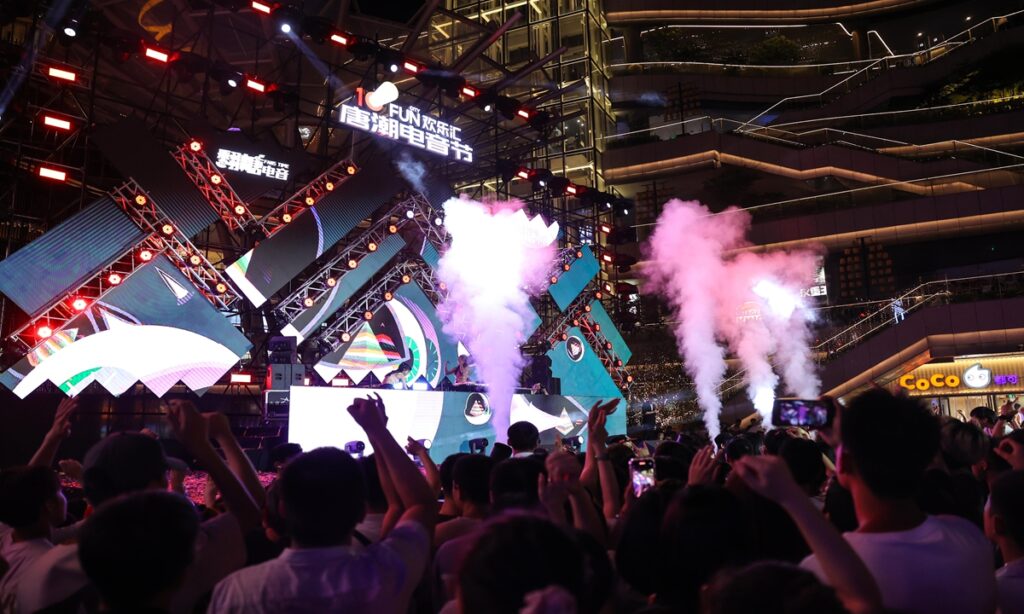With the lifting of pandemic control measures, concerts of various kinds in China have made a huge comeback. According to data from the China Association of Performing Arts, there were 193,300 commercial performances (excluding entertainment venue shows) in the first half of 2023, which is a 401 percent increase over the previous year.
Ticket sales reached 17 billion yuan, a 674 percent increase year-on-year. A total of 506 shows were arranged for large-scale concerts and music festivals, generating 2.5 billion yuan in ticket sales and attracting an audience of 5.5 million people.
However, the booming industry has not only overwhelmed ticketing platforms but also fueled the growth of scalping and ticket reselling chaos.
On July 28 and 29, the Shenzhen Public Security Bureau carried out a special campaign, arresting 14 ticket scalpers. All of them were then punished with administrative detention in accordance with the law.
From the current market situation, there is a huge profit motive for scalping tickets. Take the recently most discussed concert as an example – the 10th-anniversary concert for the much-anticipated boy group TFBOYS, said to be their last as a group – sold out in just one second due to massive demand as scalpers offer front-row seats for a staggering 200,000 yuan ($27,810).
As millions scramble for tickets, trees outside the concert stadium are also being offered to rent for 5,000 yuan an hour for those willing to climb high enough, news reports said. Telescopes for peeking into the concert from the afar trees, however, cost extra, so does insurance in case of a fall.
If only money could solve the problem. To fight for a chance to see JJ Lin Junjie, fans and scalpers are hiring graduates from prestigious universities to memorize answers to over 300 questions relating to the artists, such as “What color of shirt was JJ Lin wearing when he saw the 2019 Wimbledon Men’s Singles Final?” so that they can take part in the ticket grabbing of his concerts.
A scalper based in Beijing who requested anonymity told the Global Times that Jay Chou’s concert in Tianjin on the black market has already soared to as high as 30,000 yuan, and the price will only go up as concert date draws near.
While the phenomenon of sky-high ticket prices is once again hotly debated in 2023, the issue has indeed been around for a long time. In China, many fans are accustomed to finding ticket agents – what scalpers call themselves – to look for tickets before attending a show.
Since these professional scalpers usually get discounted tickets through insider channels, in most cases they are able to sell the tickets for less than the official price. In many cases, buying tickets through these ticket agents also usually gets you better seats in the same price range.
According to industry insiders, the reason why scalpers always have a significant number of tickets for top-tier artists’ concerts can be attributed to a murky relationship between scalpers and event organizers. While some tickets are obtained through proxy purchases or technological means, others are acquired through personal connections. A concert organizer admitted that they provide a considerable number of tickets to scalpers so that they can make more money than simply selling it out through official means, 36Kr reported.
MoreTickets, one of China’s largest secondary ticketing websites, dubbed by fans as “the biggest regulated scalper,” claims that people can buy discounted tickets for more than 90 percent of the shows on the site. The remaining 10 percent, however, most certainly comes with doubled or tripled prices, or even higher.
In the annual report on consumers’ public opinion analysis release in June by the China Consumers’ Association, there were 1,097,800 pieces of negative complaints about live show tickets.
Nonetheless, while there have always been complaints among fans, the Chinese public seems to have long gotten used to the idea of having to pay far more than the face value for a hot ticket. In 2023, however, there seems to be hope that this will end, thanks to a new ticketing mechanism that is starting to gain popularity – the “dual real-name system.”
The “dual real-name system” is one of the most effective measures to prevent ticket scalping by far, which requires the real-name registration not only for ticket purchase but also during ticket inspection. At the entrance of the venue, a person’s face, identification documents, and ticket order must match, otherwise entry to the venue will be denied.
This mechanism is already widely used in some other regions. At large-scale performances in Europe, the US and Japan, fans are asked to fill in their identification numbers when purchasing tickets online and their original documents are checked upon admission.
A Coldplay fan surnamed Lu told the Global Times that after she failed to get a ticket on official ticketing platforms for the band’s Tokyo concert, she initially turned to scalpers on Chinese social media platform Xiao Hong Shu. However, she soon gave up the idea as the concert uses a dual real-name system, which effectively prevented ticket scalpers from selling their tickets to others.
At present, not many large events in the Chinese mainland applies the dual real-name system, as it increases a lot of workflows for the organizers and ticketing platforms.
Some ticketing platforms would activate the dual real-name system, but at the same time allow the ticket transfer, which baffles many fans who suspect that the platforms are trying to provide maneuver space for scalpers.
Many fans and industry insiders have called on the Chinese mainland authorities to refer to the laws of other regions for strict legislation on ticket service.
In the Hong Kong Special Administrative Region (HKSAR), local laws make it an offence for any person selling, offering for sale, or soliciting purchase, tickets for admission of events held at licensed venues at “a price exceeding the amount fixed by the proprietor, manager or organizer.” Some states in Australia have banned the use of automatic software to harvest tickets in bulk from the primary ticket market. It is a criminal offence for anyone reselling or advertising to resell tickets to declared major events or events held at major facilities at a price 10 percent more than the “original sale price” of the event ticket in four Australian states.
There are also calls for ticketing platforms to take on more social responsibility and introduce a more consumer friendly ticketing and refund mechanism. For example, Dice, a UK ticketing platform for music performances, has introduced a ticket refund function allowing fans who cannot attend on time to refund their tickets in advance, and the refunded tickets will be given directly to fans on the waiting list.
The Shenzhen Municipal Public Security Bureau, which has been running an operation to crack down on scalping, said that they will continue to target illegal behavior, and at the same time strengthen the linkage with the industry authorities to discuss the improvement of the management mechanism of the ticketing market, and to explore a better and fairer mechanism for purchasing tickets with real names.
(Global Times)




